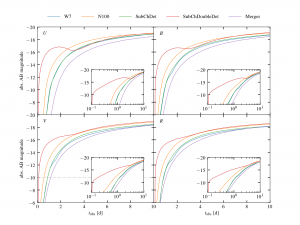Early light curves for Type Ia supernova explosion models

Upcoming high-cadence transient survey programmes will produce a wealth of observational data for Type Ia supernovae. These data sets will contain numerous events detected very early in their evolution, shortly after explosion. In a recent study, a team around Ulrich Nöbauer from the Max Planck Institute for Astrophysics, including PSO researcher Markus Kromer, used numerical simulations to calculate synthetic observables for a number of different explosion models, specifically focusing on the first few days after explosion. They show that overall the early light curve evolution is similar for most of the investigated models. Characteristic imprints are induced by radioactive material located close to the surface. However, these are very similar to the signatures expected from ejecta–CSM or ejecta–companion interaction. Apart from pure deflagration explosion models, none of the synthetic light curves exhibit the commonly assumed power-law rise. They demonstrate that this can lead to substantial errors in the determination of the time of explosion.
Publication: U. M. Noebauer, M. Kromer, S. Taubenberger, P. Baklanov, S. Blinnikov, E. Sorokina and W. Hillebrandt (2017): Early light curves for Type Ia supernova explosion models Monthly Notices of the Royal Astronomical Society, 472, 2787–2799.
This work was also featured as a research highlight at the Max Planck Institute for Astrophysics.
About HITS
HITS, the Heidelberg Institute for Theoretical Studies, was established in 2010 by physicist and SAP co-founder Klaus Tschira (1940-2015) and the Klaus Tschira Foundation as a private, non-profit research institute. HITS conducts basic research in the natural, mathematical, and computer sciences. Major research directions include complex simulations across scales, making sense of data, and enabling science via computational research. Application areas range from molecular biology to astrophysics. An essential characteristic of the Institute is interdisciplinarity, implemented in numerous cross-group and cross-disciplinary projects. The base funding of HITS is provided by the Klaus Tschira Foundation.